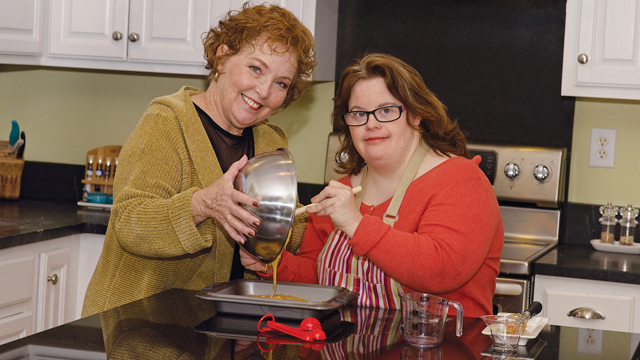Marybeth and Charles Meacham have three children: sons who are in their forties and a daughter who is thirty-eight.
Their daughter Anne attended college and now works as a textile hanger with Goodwill Industries in Richmond – she inspects donated clothes for damage and forgotten items in pockets. For four years, she shared an apartment with a roommate, and now, she lives at home. She likes to shop and enjoy meals out with friends.
And she has Down syndrome.
“Anne will tell you today that Down syndrome is something she has; it’s not who she is,” Charles says. Marybeth adds that her daughter is very healthy. “She wears glasses – that’s it!”
Down syndrome (DS), which is characterized by an additional full or extra portion of chromosome 21, has no known cause. The likelihood of an occurrence increases with a birth mother’s age, but 80 percent of children with DS are born to women under the age of thirty-five because the birth rate among women in that age group is higher. According to the U.S. Centers for Disease Control, approximately one in 700 babies born in the United States has DS, making it the most common chromosomal condition.
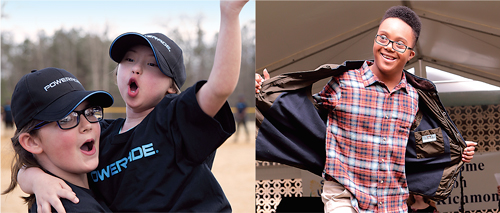
Children with DS have an increased risk for certain medical conditions: congenital heart defects, respiratory challenges, hearing problems, Alzheimer’s disease, childhood leukemia, and thyroid conditions. Years ago, people with DS may have been labeled mentally retarded; today’s terminology observes that DS includes intellectual or cognitive delays that have varying impacts on a person’s life. Life expectancy has increased dramatically in recent decades, from age twenty-five in 1983 to age sixty today, attributed largely to early intervention, a move away from institutionalization, and better outcomes from improved medical care for people with DS.
Marybeth Meacham was thirty-two when she became pregnant and thirty-three when she gave birth to Anne. Her pregnancy and delivery were normal, and – for the first time – Charles was with his wife when she gave birth.
“We were on cloud nine,” Marybeth says. “We had two boys and then a girl.”
While they were in the hospital, doctors suggested that Anne could have DS, but it wasn’t until six weeks later, when the couple met with a geneticist, that they were told Anne definitely had DS. The couple, who were then living in New Orleans, met with a social worker and immediately reached out to their local Association for Retarded Children – now known as ARC (there’s one here in Richmond) – for early intervention programs and activities.
The Meachams agree they were lucky to be experienced parents when Anne was born. Their older sons were excited to have a little sister, Marybeth says. “It was all hands on deck for the entire family.”
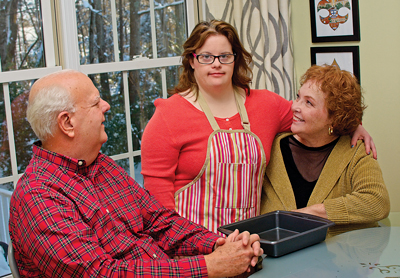
“It was exceedingly important to give her any other opportunity that one of our children would have,” Charles says about Anne. “From early on, we sought alternative education for her.”
After attending a Montessori school in Richmond until she was nine, Anne moved to public schools, where she took a mix of classes for students with special needs as well as mainstream courses with typical students. Charles recalls Anne tried two semesters of driver’s education before deciding on her own that driving wasn’t for her.
“She was frightened by it,” he says.
“We weren’t going to tell her she couldn’t do it,” Marybeth adds. “We figured she would find out for herself. We never wanted her to come back and say that we had stopped her from doing something.”
In Richmond, Anne attended PAVE – Program for Adults in Vocational Education – offered by Reynolds Community College. The only such program in the state, PAVE is designed specifically for students with intellectual, physical, emotional, and learning disabilities. Students receive instruction in a specific field so they can move into the work force and live independently, if appropriate.
For the Meachams, Anne’s education beyond high school was essential.
“Our family believes in education and the work ethic,” Marybeth says. “She’s no different. Her brothers went to college; she went to college. We all do whatever our own capacity is.”
When the family lived in New Orleans, Charles and Marybeth became charter members of a Down syndrome association, designed to support and establish a network for families of children with the condition. When the family relocated to Richmond in 1985, their first stop was the Down Syndrome Association of Greater Richmond so they could make contact with services and other families.
“As in anything that is a little out of what the world calls ‘the norm,’ it’s important to bond with people who walk the same path we walk,” Marybeth says. “We understand each other like nobody else quite does.”
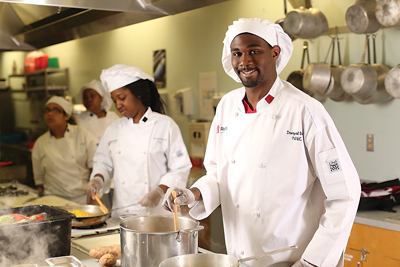
Helping Hands in RVA
The Down Syndrome Association of Greater Richmond (DSAGR) seeks to connect families with one another as well as appropriate and available services throughout the region. Through a variety of activities and special events – from morning playgroups to fathers’ nights out to skill-based classes to an annual 5k run and family festival – the nonprofit aims to “meet everybody where they are,” says Kim Owens, education director.
“We want to make sure parents have the knowledge they need to be empowered to advocate for their child,” Owens adds. “People come and learn so much just from one visit. Raising a child with a disability requires a huge amount of education.”
In 2018, DSAGR was recognized by the National Down Syndrome Congress with its Outstanding Affiliate Award, an accolade that Executive Director Terri Lancaster maintains has to do with DSAGR’s commitment to community partnerships and outreach.
“We don’t sit here and wait for people to come to us; we try to find every person with Down syndrome we can find,” Lancaster says. And, Owens adds, the national association “saw that we’re using our community resources in innovative ways. We’re not [medical] experts on Down syndrome, but we can contact people who are.”
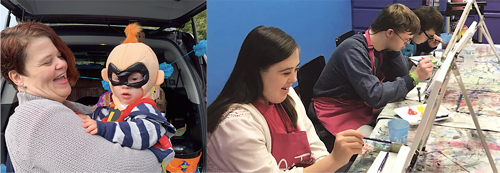
DSAGR’s community connection is demonstrated in its Summer Employment Academy, which debuted in 2017. The 4-week program places high schoolers and job coaches in four different workplaces so students can learn how to navigate the world of employment. In addition to the on-site experience, students receive classroom instruction about soft skills – like how to interact with coworkers and how to take a lunch break.
“This model is different because of its individual, not group, placement approach,” Lancaster says. “We want each student to be able to learn from this experience.”
“Like all of us, the more kids are exposed, the more choices they see, the more opportunities they will have,” Owens adds. “We shouldn’t pigeonhole them into service or restaurant jobs. Maybe they don’t want to do that.”
Lancaster says one student discovered he liked – and was good at – computer work. With that knowledge, his mother changed his schedule for the upcoming school year to include a computer class instead of studio art. Another student had a great experience at a local restaurant. She’s now employed year-round as a hostess one night a week and on Saturdays. “And she’s good at it,” Lancaster says.
A highlight of DSAGR’s year is its annual education conference, which is open to educators and parents alike. “It’s the only conference I know of that brings parents and educators together,” Owens says. “You find that people know each other; the Richmond warmth is there.”
Set for the first Saturday of February at the Short Pump Hilton, this year’s conference will have fifteen breakout sessions and an expected 400 attendees, a far cry from the first conference, with six sessions and one hundred participants.
“We want parents to have the skills and knowledge they need so they can be their child’s best advocate,” Owens says. “There’s a lot of satisfaction and pride when you can do for yourself and your family. People want to be in charge of their own lives.”
Preparing for the Future
Karen and Jose Guadalupe’s summer plans include a visit to George Mason University with their daughter, Aaliyah. Even though Aaliyah is only twelve, Karen wants her to become familiar with GMU’s Learning into Future Environments (LIFE) program, which offers a 4-year college experience for students with cognitive disabilities.
“Aaliyah is high-functioning and an avid reader,” Karen says. “She’ll put you on point. If you tell her there’s a moon, she wants to figure out how to get there.”
Aaliyah’s medical history is not without challenges. In addition to having Down syndrome, she was born with a hole in her heart – which closed on its own after about a month – and experienced seizures as an infant, but only for a short time. In January 2017, Aaliyah was diagnosed with leukemia; her treatment will continue through May and occasionally requires hospitalization.
But she’s going strong.
Aaliyah knows sign language and is learning Spanish. She sings in her middle school chorus and recently began to participate in SPARC’s Live Art program, in which children with disabilities take classes and perform with children who are typically developing.
She’s also opened her parents’ world, Karen says.
“This has definitely been an awakening experience for us,” Karen says. “We learned early on that this [situation] is far beyond our control. We can’t fix this, but there are good people in the world who have reached out to us.”
Important Life Lessons
Pediatrician and pediatric rheumatologist Harry L. Gewanter says that while it’s important for every parent to work in concert with her child’s doctor, it’s essential when that child has a special need. As the parent of an adult son with Down syndrome, he should know.
“Medicine is a group participation act,” Gewanter says. “Doctors are trying to make movies out of snapshots – short visits separated by time. Parents are living the movie.”
Gewanter saw this not only in his medical practice, but as a father. His second child, Neil, now thirty-three, lives in a group home and works for a local hotel.
“People are surprised when he can do things, but he’s only got one more chromosome than you,” Gewanter says. “He might do it differently, and he might do things more slowly, but speed and style are irrelevant.”
Gewanter notes the biggest challenge for parents when they first learn their child has DS is often entirely personal – they have to reevaluate their expectations.
“By the third day [of Neil’s life],
I realized he didn’t care about having Down syndrome,” Gewanter says. “I was the one bothered by it. I had all these plans for him that weren’t going to come true. The reality was I didn’t know what the plans were going to be anyway. It was my problem, not
his problem.”
Gewanter notes it’s common for parents to feel overwhelmed when they have a child who has special needs. To alleviate some of that stress, Gewanter and two colleagues (Colleen Kraft and Fran Gallagher) founded Medical Home Plus in 2001. Incorporated as a nonprofit in 2003, MHP works with individual families to connect them to available support systems and resources.
“We’re like the connective tissue; we can help you get to the places you need,” he says, adding that some support is simply parent-to-parent.
“When you hang out with people who have the same issues you do, you don’t have to go through the first half hour of people feeling sorry for you, having to explain things,” he says, adding it’s helpful to be in touch with families whose kids are just a few years older than yours. “In these situations, you can’t see the trees for the bark, because you’re so close. But you need to see what’s coming down the pike.”
Gewanter says he’s learned much from having a son with DS.
“Would I rather Neil didn’t have Down syndrome? Sure. Did I gain significantly from him having Down syndrome? Yes. Was parenting him the biggest problem in our home? No,” he says. “Neil taught my brain to be a lot more flexible, to approach people differently, and to accept a wider diversity in human behavior,” he says.
About raising children – whether they have DS or not – Lancaster, who is DSAGR’s executive director, sums it up like this: “Every parent wants their child to be a valued part of the community; that’s the bottom line.”


